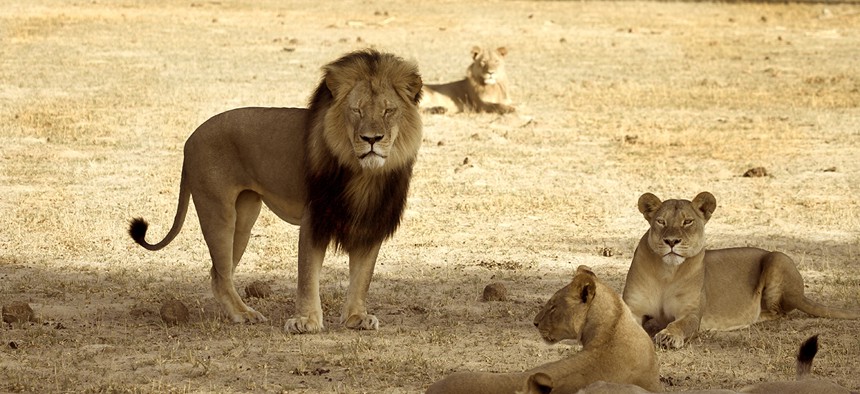
Cecil patrols among his pride in Hwange National Park in 2012. paula french/Shutterstock.com
Fish and Wildlife Wants to Talk to Famous Lion’s Killer ‘Immediately’
Congressional Democrats are asking the Interior Department to finalize a rule to better protect African lions.
The Obama administration is probing the killing of Cecil the lion but hasn't been able to reach Walter Palmer, the Minnesota hunter and dentist who allegedly killed Cecil in Zimbabwe after he and two others lured the beloved lion out of a national park.
"The U.S. Fish & Wildlife Service is investigating the circumstances surrounding the killing of 'Cecil the lion.' That investigation will take us wherever the facts lead," said Edward Grace, the agency's deputy chief of law enforcement, in a statement.
"At this point in time, however, multiple efforts to contact Dr. Walter Palmer have been unsuccessful. We ask that Dr. Palmer or his representative contact us immediately," he added.
The killing and beheading of the popular 13-year-old lion has provoked outrage, widespread publicity, and an explosion of online scorn toward Palmer.
Grace's statement goes further than yesterday's Fish & Wildlife Service comment that the agency is "gathering facts about the issue and will assist Zimbabwe officials in whatever manner requested."
Palmer, in a statement to the Minneapolis Star Tribune two days ago, said that he hadn't been contacted by authorities in Zimbabwe or in the U.S. but pledged to "assist them in any inquiries they may have."
The Associated Press quoted a spokeswoman for Zimbabwean police Tuesday saying they are looking for Palmer.
According to the BBC, one of the two men from Zimbabwe who assisted Palmer, Theo Bronkhorst, pleaded not guilty in a Zimbabwean court Wednesday to the charge of "failing to prevent an unlawful hunt."
Palmer, whose practice has been shuttered amid the outrage over Cecil's death, expressed regret about the killing. "I had no idea that the lion I took was a known, local favorite, was collared and part of a study until the end of the hunt. I relied on the expertise of my local professional guides to ensure a legal hunt," he said in his statement.
The confirmation that U.S. authorities want to speak with Palmer comes as several dozen House Democrats, calling Cecil's death a "reminder of the perils the African lion faces," are urging the Interior Department to quickly boost protections for the iconic species.
In a letter today to Interior Secretary Sally Jewell, approximately 50 lawmakers will call for the Fish & Wildlife Service to "expeditiously" finalize a rule that lists the lion as "threatened" under the Endangered Species Act, arguing this would improve conservation in several ways.
Here's how the letter led by Raul Grijalva, the top Democrat on the House Natural Resources Committee, makes the case for the rule:
"First, it would outlaw the trade of African lions or lion parts by people subject to the jurisdiction of the United States, except under limited circumstances. Second, it would require the Fish and Wildlife Service to certify that sport-hunted lion trophies could only be imported into the United States from countries with sound conservation plans that enhance the survival of the species in the wild. Third, it would make the African lion eligible for funding for conservation and recovery efforts under the [Endangered Species Act]."
African lions have declined by almost 50 percent in the past three decades to under 40,000 today, and inhabit just 22 percent of their former range, the letter states.
The FWS issued a draft rule in October, took public comments until late January and is now crafting the final rule. The process "generally" takes about a year, FWS said.
However, those protections would not stop a number of threats.
According to the Fish & Wildlife Service, the biggest threats facing the lions are loss of habitat, loss of animals they prey upon, and conflict between humans and lions, which is spurred by expansion of human settlements and agriculture into the lions' natural habitat. With their native prey disappearing, lions end up killing livestock, which leads to "retaliatory" killings.
In a separate letter, Grijalva is asking Natural Resources Committee Chairman Rob Bishop to hold a hearing in September on Grijalva's bill, which would create a new "Rare Cats and Canids Conservation Fund" at Interior. The bill "would enhance U.S. financial support for international conservation efforts that would protect lions like Cecil, as well as other rare cats and wild dogs with dwindling populations," his letter states.
(Image via paula french/Shutterstock.com)







